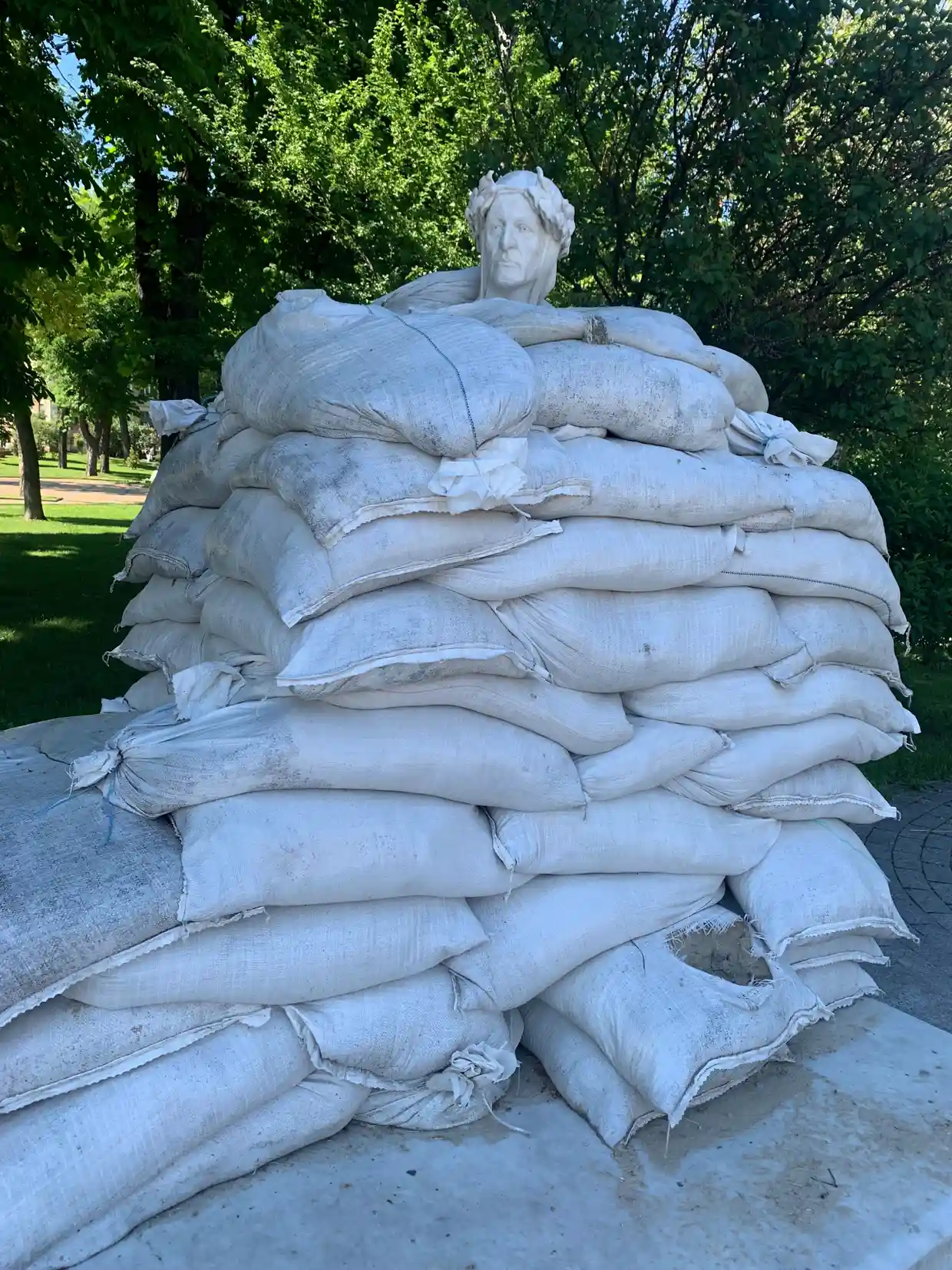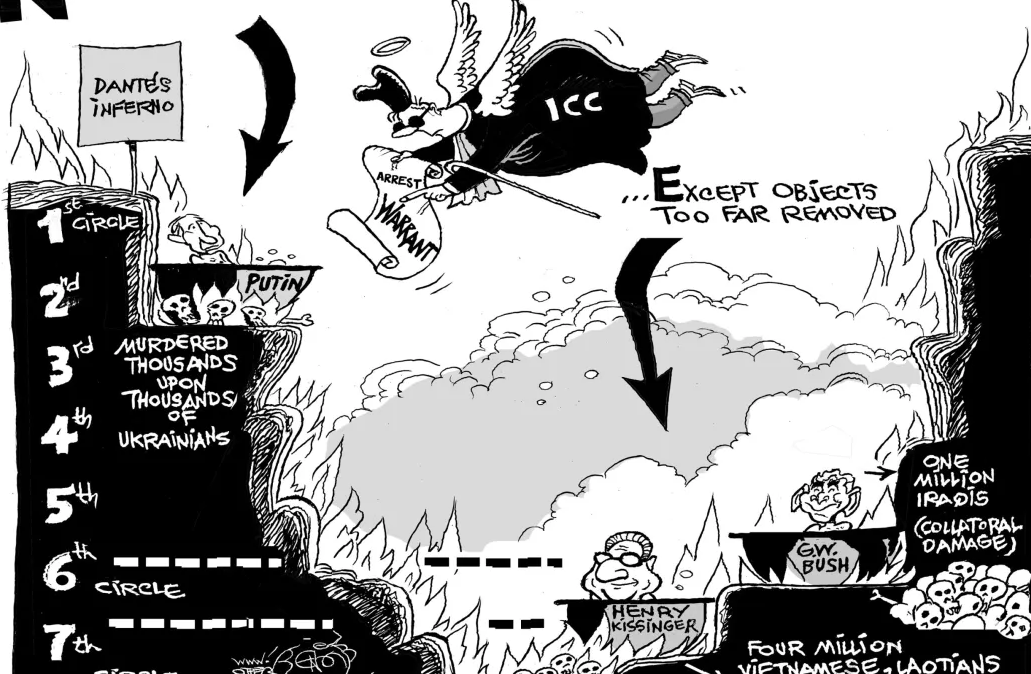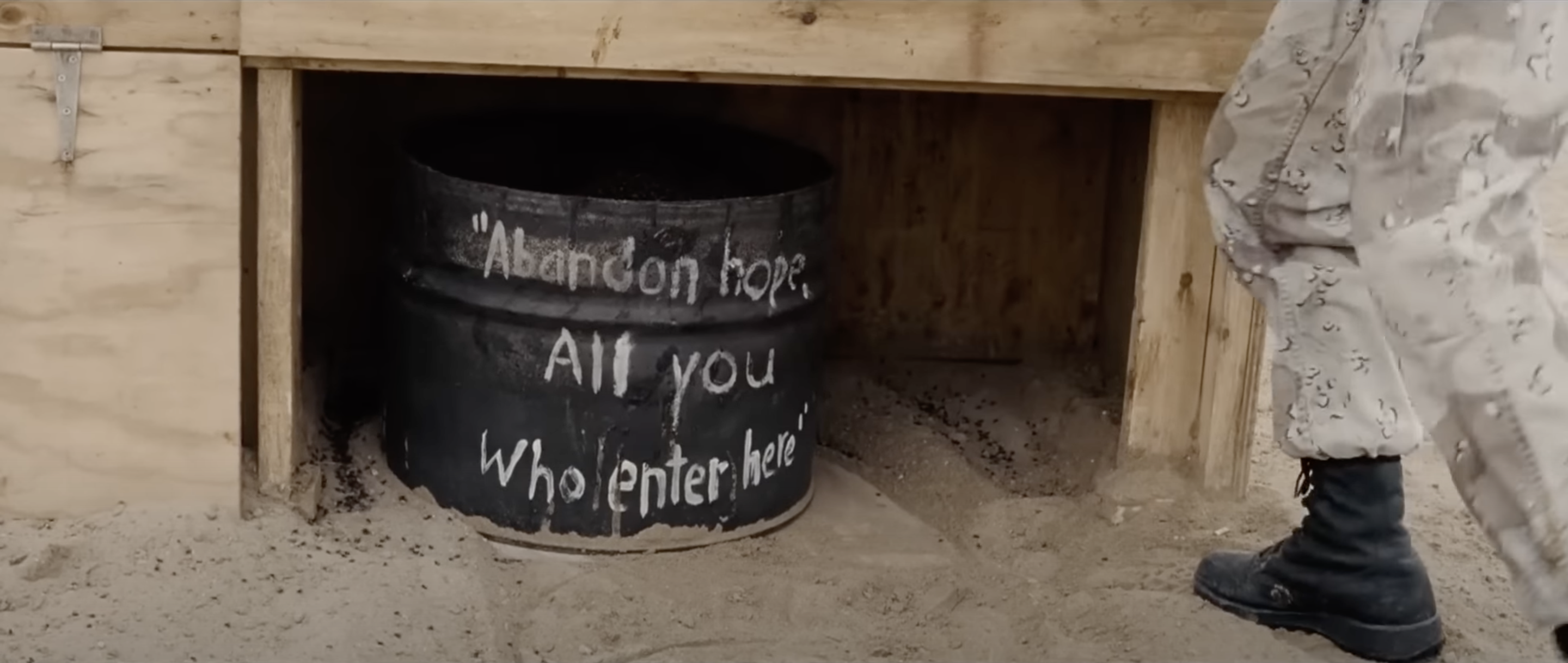“Putin’s terrible crimes in Ukraine should be prosecuted, but he’s still not the worst war criminal alive today.” —Khalil Bendib, “Cartoon: Dante’s Inferno, War Crimes Edition,” Otherwords, April 5, 2023 (retrieved March 6, 2024)
Jarhead (2005)
“When Swofford is stuck on latrine duty, the words ‘Abandon all hope, ye who enter here’ are scrawled on the shit bucket. This is a well-known line from Inferno by the poet Dante Alighieri. In the poem, the words appeared scrawled upon the gates of hell.” —James Clark, “7 Things You Probably Never Knew About Jarhead,” Task & Purpose, April 6, 2017 (retrieved February 20, 2024)
Contributed by Alex Milanese
“In Kyiv, I saw Dante under sandbags – a modern image of the hell of war”
“I took quite a lot of phot os on my phone when I was in Ukraine this year, but this one jumped out at me as I was scrolling through them. Here we have Dante – the Italian poet, philosopher, writer – with his marble head poking up out of the sandbags. It’s in a park on Volodymyr Hill in the centre of Kyiv.”
os on my phone when I was in Ukraine this year, but this one jumped out at me as I was scrolling through them. Here we have Dante – the Italian poet, philosopher, writer – with his marble head poking up out of the sandbags. It’s in a park on Volodymyr Hill in the centre of Kyiv.”
“It’s not just an arresting image. Dante is a harbinger of the Renaissance; he’s a symbol of culture and learning. And that is the opposite of war, which is a regression to dark times. This is what Ukraine and Kyiv are having to labour under – and so Dante finds himself stifled by sandbags. Of course, one also thinks of the Divine Comedy and the seventh circle of hell, which is violence. That’s what the people of Ukraine have been enduring: a modern circle of hell.”
“The fact that Dante had to be covered with sandbags tells you everything – the Russians are attacking things that are nothing to do with a military campaign. That is a particular hell, when civilians are seen as legitimate targets for an advancing army. And as soon as I see this image, all of this floods into my mind.” –Clive Myrie, The Guardian, December 12, 2022
Tyler E. Boudreau, Packing Inferno: The Unmaking of a Marine (2008)
 “Mr. Boudreau’s book, Packing Inferno (Feral House, $16.95), is an uncompromising narrative of his experiences in Iraq and his struggle to deal with the human consequences, both in the Middle East and, later, at home. His writing is vivid, detailed and filled with emotion.
“Mr. Boudreau’s book, Packing Inferno (Feral House, $16.95), is an uncompromising narrative of his experiences in Iraq and his struggle to deal with the human consequences, both in the Middle East and, later, at home. His writing is vivid, detailed and filled with emotion.
“The book’s title refers to his having discovered that, among other books, he had packed Dante’s Inferno when he was deployed to Iraq, in what appeared to be a prescient move as the months went by. Mr. Boudreau writes this about a few tense moments when he and his men had to decide what to do when a truck heading in the wrong direction barreled toward them on the shoulder of the road” [. . .] –Pamela H. Sacks, Telegram, March 1, 2009
Martin Luther King, Jr., on “The hottest places in hell…” (April 15, 1967)
 “I come to participate in this significant demonstration today because my conscience leaves me no other choice. I join you in this mobilization because I cannot be a silent onlooker while evil rages. I am here because I agree with Dante, that: ‘The hottest places in hell are reserved for those who, in a period of moral crisis, maintain their neutrality.‘ In these days of emotional tension, when the problems of the world are gigantic in extent and chaotic in detail, there is no greater need than for sober thinking, mature judgment, and creative dissent.” [. . .] –Martin Luther King, Jr., Mobilization to End the War in Vietnam (April 15, 1967)
“I come to participate in this significant demonstration today because my conscience leaves me no other choice. I join you in this mobilization because I cannot be a silent onlooker while evil rages. I am here because I agree with Dante, that: ‘The hottest places in hell are reserved for those who, in a period of moral crisis, maintain their neutrality.‘ In these days of emotional tension, when the problems of the world are gigantic in extent and chaotic in detail, there is no greater need than for sober thinking, mature judgment, and creative dissent.” [. . .] –Martin Luther King, Jr., Mobilization to End the War in Vietnam (April 15, 1967)
Read the full address here.
Images from the day of the address, including the image pictured at right, can be viewed here.
The frequently misattributed quotation was also cited multiple times in John F. Kennedy’s speeches (see here). You can see other examples filed under the tag “Hottest Places.”


